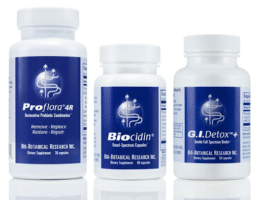We’re sure you’ve heard the saying “you are what you eat.” While it may sound cliché, it’s actually true when it comes to your gut health.
Your digestive tract is home to trillions of microorganisms that play a crucial role in your overall well-being. So, if you want to improve your vitality, it makes sense that you should start with taking care of your gut.
Ready to learn more? Let’s explore what a healthy gut is and the signs that could show you have a poorly functioning digestive system. Then we’ll provide you with the ultimate list of tips to help you support your microbiome and encourage whole-body wellness.
Your Gut Health Cheat Sheet
To get started, here’s a quick cheat sheet for achieving optimal gut health. Keep these tips on hand to maintain balanced bacteria and support a healthier gastrointestinal tract. We’ll explain more about each point further in the article.
What Is a Healthy Gut?
Having a healthy gut means your gastrointestinal (GI) tract, including your stomach and small and large intestines, is functioning optimally. You shouldn’t experience any discomfort, such as pain or diarrhea, or have any digestive diseases.
A healthy system contains a diverse range of microorganisms, such as bacteria, fungi, protozoa, and other microbes. This collection of tiny creatures makes up your gut microbiome, with its composition being unique to you.
It plays a vital role in digestion, protects you against pathogens, produces essential nutrients, and regulates your immune system. A compromised microbiome can lead to a wide range of issues, such as food intolerances, skin problems, mood disorders, and weakened defenses.
This is why it’s so important to prioritize gut health in your daily life.
5 Signs of Imbalanced Gut Bacteria
Poor gut health can manifest in various ways which differ amongst individuals. These are five of the most common signs of an unbalanced microbiome:
- Digestive issues: Inflammation in the gut lining causes problems like constipation, diarrhea, bloating, gas, or abdominal pain. A healthy digestive system has fewer difficulties processing food, likely reducing discomfort.
- Food intolerances: Hypersensitivity to ingredients like lactose or gluten is often a sign of poor gut health [1]. If you have a damaged GI tract lining, undigested food can leak into your bloodstream, triggering an immune response.
- Fatigue and low energy: Studies show that an imbalanced microbiome may lead to chronic sleep disruption [2]. It could also hinder the body from properly absorbing nutrients, leading to tiredness and lethargy.
- Skin irritation: Dysfunctional digestion can also manifest in the form of dermal issues like eczema, acne, and rosacea. Lower concentrations of beneficial gut bacteria may impact the body’s immune system, often leading to skin problems.
- Autoimmune diseases: Scientists have found that an unhealthy gut may increase systemic inflammation and change immune system function [3]. These alterations can result in the body attacking its cells and tissues.
Important note: Not all the symptoms we mentioned necessarily indicate poor gut health, and could be due to other underlying conditions. If you experience any of these signs, it’s best to consult with your doctor to determine the root cause of your discomfort.
4 Things You Can Do for Your Gut
The good news is that there are effective ways to improve gut health. Below, we’ve compiled a list of our four most practical tips to incorporate into your lifestyle to support the growth of beneficial bacteria and improve digestion.
You’ll be on your way to a happier GI tract in no time.
1. Eat Fermented Foods
Fermented foods are a rich source of beneficial bacteria. They’re involved in a natural process in which yeasts break down their sugars and starches, producing lactic acid and other valuable compounds.
Some examples are:
- Yogurt
- Kefir
- Sauerkraut
- Kimchi
- Kombucha
Research suggests consuming these foods could help improve the gut microbiome, as they’re teeming with live microbes capable of colonizing the digestive system [4]. They introduce a diverse array of good bacteria into your gut, which could help restore any imbalances.
In addition, the lactic acid produced during fermentation can help to break down food in your stomach, making it easier for your body to absorb nutrients [5]. This mechanism is particularly valuable for individuals with bloating, gas, or constipation.
2. Stay Hydrated
Water is essential for our bodies to function properly. The liquid helps to regulate temperature, supports organ function, and boosts physical performance.
Researchers discovered that people who consumed more water had lower amounts of infection-causing microorganisms [6].
Another way hydration can enhance gut health is by promoting regular bowel habits, as low water consumption is a risk factor for constipation [7]. Increasing your H20 intake can keep your colon lubricated to help relieve the discomfort.
Aim to drink at least two liters of water per day and consume foods with a high H20 content, such as fruits and vegetables.
Pro Tip: If you’re not a fan of drinking two liters of water a day, try NutriDyn Dynamic Hydrate instead. It includes all of the key minerals and electrolytes you need in water and comes in 4 flavors:
- Blue raspberry
- Orange
- Grape
- Lemon
Simply mix 1 scoop of the powder into 8 ounces of water and enjoy the benefits without the tastelessness of water.
3. Take Mucosal Support Supplements
Mucosal support supplements are a helpful addition to any gut health regimen.
The mucosa is a layer of protective tissue lining the digestive tract that helps prevent harmful substances from entering the bloodstream. Should this barrier become compromised, it can lead to inflammation and damage the gut.
Taking mucosal support supplements can encourage digestive health and reduce the risk of gut-related issues.
Dynamic GI Integrity is a wonderful option to support the health of your mucosa and promote optimal intestinal function. The product’s nutrients, including glutamine, glucosamine, zinc, and vitamin A, can help strengthen your digestive lining.
Glutamine is a primary fuel source for the cells of the gut mucosa, helping to promote repair and regeneration [8]. Glucosamine reportedly helps reduce inflammation and improve the barrier’s function, while studies show zinc supports gut integrity [9,10].
Eleanor Y. has experienced this efficacy firsthand. Dynamic GI Integrity helped ease her gastric problems and reduced her need for medications:
Other powerful supplements that work to enhance gut health include:
| Supplement | Key Benefits | Best For |
| MegaMucosa | Improves gut barrier function, promotes gastric repair and regeneration | Individuals with autoimmune conditions and leaky gut syndrome |
| UltraGI Replenish | Relieves digestive discomfort, supports gut lining integrity and function | Individuals with inflammatory bowel disease, irritable bowel syndrome, and other digestive issues |
| Mega IgG2000 | Naturally detoxes the gut by binding to toxins, pathogens and bacteria die off | Anyone looking to support their gut health by reducing the waste burden |
| MegaSporeBiotic | Feeds and supports helpful bacteria in the small intestine | Those wanting to maintain or improve their gut barrier function for better digestive health. |
| MegaPreBiotic | Feeds beneficial bacteria in your gut (including Bifidobacteria, Akkermansia muciniphila, and aecalibacterium prausnitzii) | Anyone who suffers from digestive issues |
Remember: The best supplement for you depends on your specific needs and goals. We have several high-quality products addressing compromised gut function that can support your GI tract and promote overall wellness.
4. Work on Your Mental Health
It’s becoming increasingly clear that there’s a close connection between gut health and mental well-being. Stress and other mood issues can negatively impact your digestion by altering your system’s balance of bacteria, impairing function.
The brain-gut connection describes this complex relationship. When we experience negative emotions, our mind signals our enteric nervous system, also known as the “second brain,” to release hormones that alter digestive processes [11, 12].
This mechanism could cause inflammation, change gastric motility, and disrupt the gut microbiota, all affecting the GI tract.
In contrast, positive feelings and a healthy mental state can promote the release of digestive enzymes and enhance the growth of beneficial bacteria, ultimately improving gut health [13].
Support your gut-brain function to promote whole-body wellness. Practicing yoga, getting enough sleep, and exercise are some techniques known to lower your stress levels and enhance this critical connection.
Happy Gut, Healthy Life
A happy gut is essential for a healthy life. Our digestive system affects many aspects of our well-being, and taking the steps to improve it can have positive implications on more than just our stomachs.
By using our everyday cheat sheet to enhance your gut health, you too could experience the benefits of a happier digestive system and elevated vitality. Slight changes in your lifestyle can lead to enormous improvements, so start taking care of your GI tract today.
Contact us if you’re interested in learning more about the products we offer to improve gut health. Simply Nutrient’s knowledgeable customer service team can answer your questions and provide guidance on which supplements may be best for your specific goals.
We’re dedicated to helping our clients achieve optimal health and well-being through our holistic approach to nutrition and lifestyle. Let’s chat about how you can start your journey to a happier gut.
Resources
[1] https://gut.bmj.com/content/71/1/215
[2] https://pubmed.ncbi.nlm.nih.gov/32668369/
[3] https://www.tandfonline.com/doi/full/10.1080/17474124.2018.1517044
[4] https://academic.oup.com/jn/article/150/7/1680/5814068?login=true
[5] https://pubmed.ncbi.nlm.nih.gov/25672527/
[6] https://academic.oup.com/jn/article/152/1/171/6395031
[7] https://www.ncbi.nlm.nih.gov/pmc/articles/PMC4325863/
[8] https://pubmed.ncbi.nlm.nih.gov/17024034/#:~:text=The%20major%20fuels%20for%20the,are%20of%20much%20less%20importance.
[9] https://www.ncbi.nlm.nih.gov/pmc/articles/PMC8308242/
[10] https://www.ncbi.nlm.nih.gov/pmc/articles/PMC7302722/#:~:text=Zinc%20maintains%20the%20function%20and,pathogens%20%5B25%2D27%5D.
[11] https://www.ncbi.nlm.nih.gov/pmc/articles/PMC4367209/
[12] https://www.ncbi.nlm.nih.gov/pmc/articles/PMC4362231/
[13] https://pubmed.ncbi.nlm.nih.gov/22968153/
NOTHING IN THIS WEBSITE IS INTENDED AS, OR SHOULD BE CONSTRUED AS, MEDICAL ADVICE. ANY HEALTHCARE AND/OR NUTRITIONAL MATERIAL CONTAINED IN THIS WEBSITE IS FOR CONSUMER INFORMATIONAL AND EDUCATIONAL PURPOSES ONLY. SUCH MATERIAL IS NOT INTENDED AS MEDICAL ADVICE FOR CONDITIONS OR TREATMENT, NOR IS IT INTENDED AS A SUBSTITUTE FOR A MEDICAL EXAMINATION BY A HEALTHCARE PROFESSIONAL. CONSUMERS SHOULD CONSULT THEIR OWN HEALTH CARE PROFESSIONALS FOR INDIVIDUAL MEDICAL RECOMMENDATIONS.
- Magnesium Threonate: An Honest Buying Guide for Health Enthusiasts - March 21, 2024
- Magnesium Citrate Vs Glycinate: 5 Key Differences And Benefits - March 14, 2024
- How to Pick the Best Magnesium Glycinate Supplement for You - March 7, 2024




